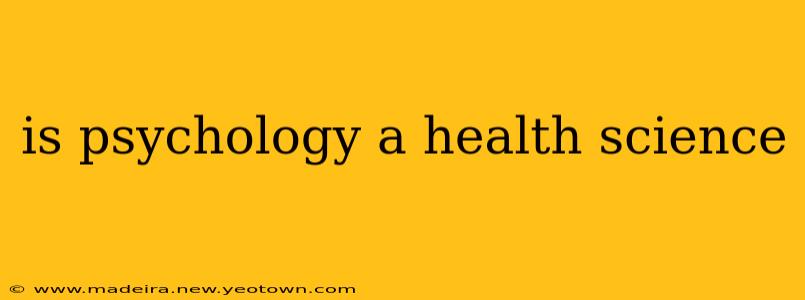Is Psychology a Health Science? Unraveling the Mind-Body Connection
The question of whether psychology is a health science is a fascinating one, sparking debate among professionals and students alike. The answer, simply put, is: it depends on the perspective. While psychology isn't always directly classified as a health science in the same vein as, say, nursing or medicine, its strong ties to health and well-being are undeniable. Let's delve deeper into this complex relationship.
To understand the nuances, we need to explore the different branches of psychology and how they intersect with health.
What are the different branches of psychology, and how do they relate to health?
Psychology is a broad field, encompassing various specializations. Some branches directly address health issues, while others indirectly contribute to overall well-being. For example:
-
Clinical Psychology: This branch focuses on diagnosing and treating mental disorders. Clinical psychologists work directly with individuals experiencing conditions like depression, anxiety, and trauma, making it a clear-cut health science application. They often collaborate with medical professionals in integrated care settings, emphasizing the mind-body connection.
-
Counseling Psychology: Counseling psychologists help individuals cope with life challenges and improve their overall mental health. While not always focused on diagnosable disorders, they play a vital role in preventative health and promoting well-being.
-
Health Psychology: This field specifically examines the psychological influences on physical health. Health psychologists study how stress affects the immune system, explore the role of behavior in disease prevention, and develop interventions to promote healthier lifestyles. This branch is explicitly a health science, bridging the gap between mind and body.
-
Neuropsychology: This fascinating area investigates the relationship between brain function and behavior. By studying brain injuries, neuropsychologists shed light on the neurological underpinnings of mental processes and disorders, again highlighting the close links between psychological and physical health.
-
Other Branches: While areas like developmental, social, and cognitive psychology might not directly treat illness, their research contributes fundamentally to our understanding of human behavior and mental processes, which inform the health sciences. For example, understanding cognitive development informs interventions for learning disabilities, while social psychology insights help develop effective public health campaigns.
Is psychology considered a medical science?
This is a crucial distinction. While psychology deeply informs healthcare, it's not typically considered a medical science in the same category as medicine or surgery. Medical science primarily deals with the physical body and its treatment of diseases. Psychology, while increasingly integrated with medicine, primarily deals with mental processes, behaviors, and emotional well-being. However, the two are increasingly intertwined, especially with the rise of fields like behavioral medicine and psychoneuroimmunology.
How does psychology contribute to overall health and well-being?
Psychology's contribution to overall health and well-being is significant and multifaceted:
-
Early Intervention and Prevention: Psychology plays a critical role in identifying and addressing mental health issues early, preventing escalation and long-term complications.
-
Chronic Disease Management: Psychological interventions are increasingly used to manage chronic conditions like heart disease and diabetes, improving patient adherence to treatment plans and enhancing overall quality of life.
-
Promoting Healthy Behaviors: Psychology's principles are used to promote healthier lifestyles, such as encouraging regular exercise, healthy eating, and smoking cessation.
-
Improving Quality of Life: Psychology focuses on enhancing overall well-being, leading to increased happiness, reduced stress, and improved life satisfaction, all of which contribute to better health outcomes.
In conclusion:
While not always directly labeled a health science in the same way as other fields like nursing or medicine, psychology's contribution to health and well-being is undeniably significant and growing. Its various branches address physical and mental health, playing a crucial role in treatment, prevention, and overall well-being. The increasingly intertwined nature of mind and body solidifies psychology's important place within the broader healthcare landscape.

